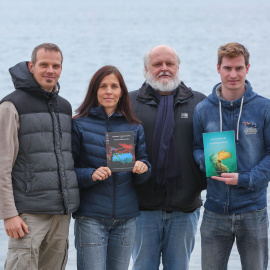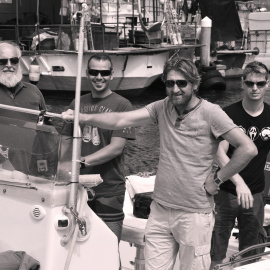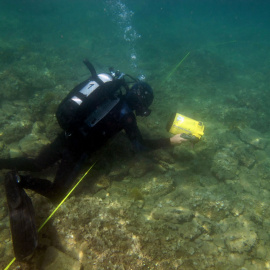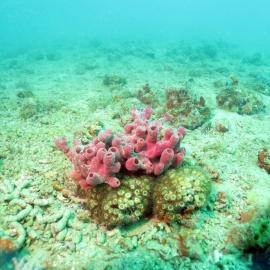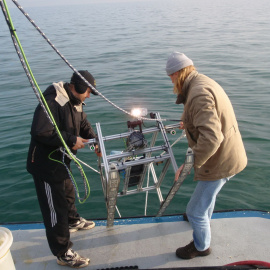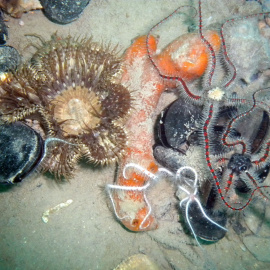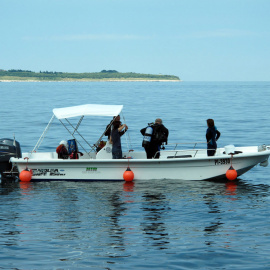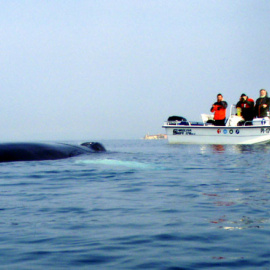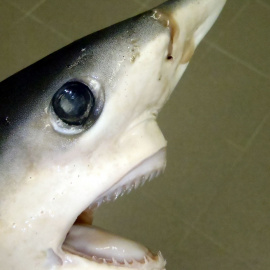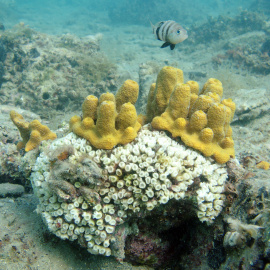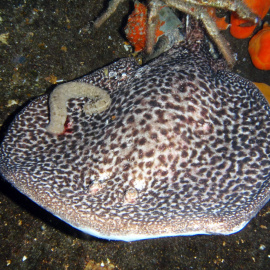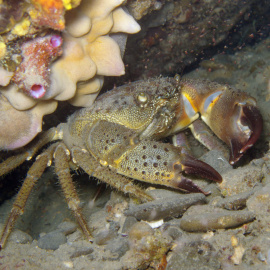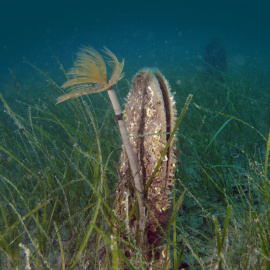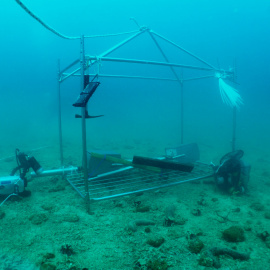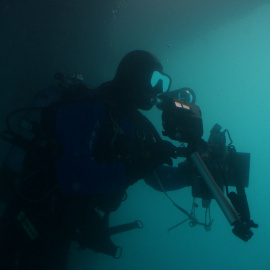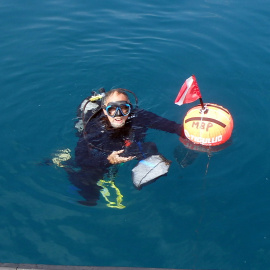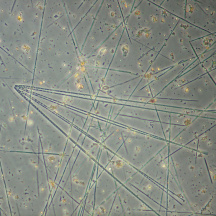Biodiversity

BIODIVERSITY GROUP
![]()
WHO WE ARE
Head of the research group:
Prof. dr. Lovrenc Lipej, biology graduate
Researchers:
Dr. Martina Orlando Bonaca, biology graduate
Dr. Borut Mavrič, biology graduate
Domen Trkov, student
Technicians:
Tihomir Makovec, head of the diving base
Jernej Uhan, technician

COLLABORATIONS
- National Institute of Oceanography and Experimental Geophysics (OGS), Trieste, Italy (Istituto Nazionale di Oceanografia e di Geofisica Sperimentale (OGS), Trieste, Italia),
- University of Trieste, Department of Life Sciences, Italy (Università degli Studi di Trieste, Dipartimento di Scienze della Vita, Italia),
- Environmental Protection Agency of Friuli Venezia Giulia (ARPA FVG), Trieste, Italy (Agenzia Regionale per la Protezione dell’Ambiente del Friuli Venezia Giulia, Trieste, Italia),
- Protected area Miramare Marine Reserve, Italy (Area Protetta Riserva Marina di Miramare – WWF Italia),
- Center for Marine Research of the Ruđer Bošković Institute (CIM), Rovinj, Croatia (Institut Ruđer Bošković, Centar za istraživanje mora, Rovinj, Hrvatska),
- Institute of Oceanography and Fisheries, Split, Croatia (Institut za oceanografiju i ribarstvo, Split, Hrvatska),
- Natural Sciences and Mathematics Faculty, University of Zagreb, Croatia (Prirodoslovno-matematički fakultet, Vseučilišče v Zagrebu, Hrvatska),
- Natural History Museum of Rijeka, Croatia (Prirodoslovni muzej Rijeka, Hrvatska),
- University of Nova Gorica (Università di Nova Gorica),
- Aquarium Piran (Akvarij Piran),
- Institute for Water of the Republic of Slovenia, Ljubljana (Inštitut za vode Republike Slovenije, Ljubljana),
- Slovenian Environment Agency, Ljubljana (Agencija Republike Slovenije za okolje, Ljubljana),
- National Agricultural Research Foundation (NAGREF), Fisheries Research Institute (FRI), Marine Ecology & Technology Lab, Nea Peramos, Kavala, Greece,
- University of Montpellier 2, Sciences and Techniques of Languedoc, Laboratory of ichthyology, France (Université Montpellier 2, Sciences et Techniques du Languedoc, Laboratoire d’Ichtyologie, France).
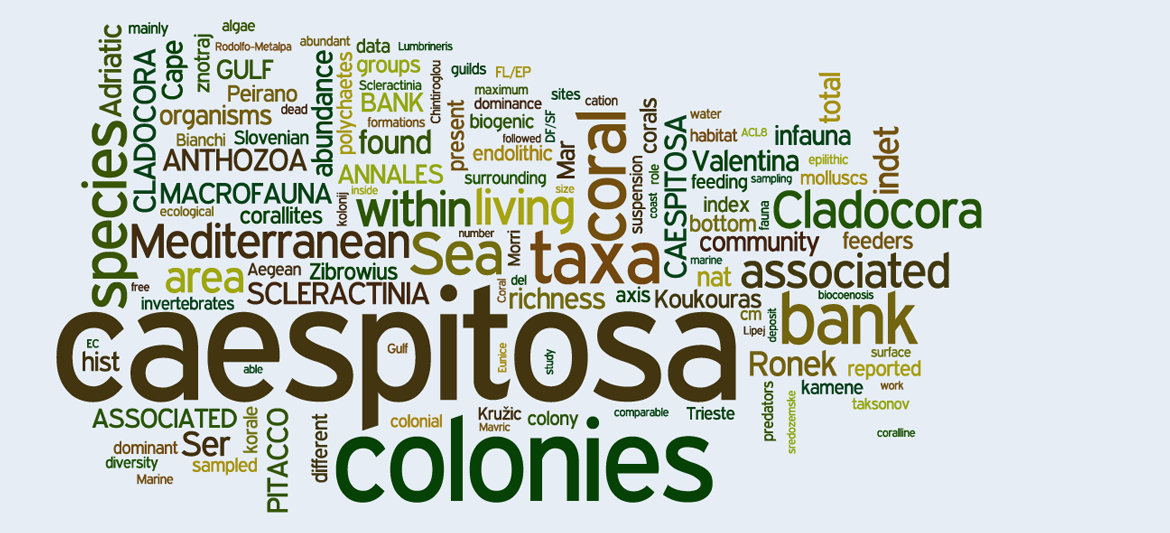
Research on marine biodiversity is crucial in understanding what is happening in the sea and to comprehend the impact of anthropogenic factors on the marine environment. At the same time this kind of research is indispensable for assessing the ecological and environmental status of the sea as identified in European environmental legislation (Water Framework Directive, Marine Strategy Framework Directive). In concordance with this legislation, we are selecting several biological indicators for the appropriate evaluation of the status of the sea at the level of species, habitat types, and benthic and nectonic communities. In this context we are continually monitoring the status of benthic invertebrates, macroalgae, seagrass meadows, fish assemblage, Mediterranean stony coral, biogenic formations and other target species. We prepared a detailed and comprehensive monitoring program for the Slovenian sea, which contains both biological elements and supporting physico-chemical elements, in the contenxt of the implementation of the Marine Strategy Framework Directive.

FIELD OF RESEARCH
§ For an overview and assessment of the status of habitat types in the circalittoral belt we are developing video-surveillance method with camera attached to a special sledge that will allow monitoring and evaluation of the situation in a non-destructive manner. Five new species of algae were recorded in the circalittoral belt for the Slovenian sea and published in an original research paper (Falace et al., 2011). The understanding of the processes and changes in biodiversity of the Slovenian sea is very important for the prediction of certain consequences (e.g. climate changes) and a rapid response. Special attention is therefore devoted to the study of Mediterranean stony coral (Cladocora caespitosa). We are conducting extensive sampling of the two largest biogenic formations in front of Cape Ronek and Debeli rtič. We are estimating population density of colonies of this endangered species, describing macrofauna (Pitacco et al., 2014) and coastal fish assemblage. At both localities we also sampling the sediment, mostly composed of dead corallites of the Mediterranean stony coral, which await further research. Colonies of Mediterranean stony coral are also used to measure the annual growth of its corallites, to determine the impact of abiotic factors, especially in relation to climate changes. In fact, recently coral bleaching phenomenon (Kružić et al., 2014) was studied in Slovenian coastal waters and at the Mljet Island (Croatia), where a multiannual project is going on together with Croatian colleagues.
§ At the same time, we are completing the mapping of micro- and macrohabitat types of marine protected areas (MPAs) and selected areas outside MPAs. We are mainly using non-destructive diving observation methods. We also developed an index to assess the status of habitat types in the infralittoral zone, based on an analysis of three ecological factors, namely vegetation cover, spatial heterogeneity and density of wrasses. We developed also an index for the assessment of the hydromorphological alteration of the rocky coastal belt (Orlando-Bonaca et al., 2012) and an index for the assessment of the status of seagrass meadows of the Lesser Neptune grass (Cymodocea nodosa) in the coastal zone, which was tested also in Italian waters of the Gulf of Trieste. Some contributions are dealing also with approaches to the sampling design for the need of the Water Framework Directive in Slovenia, like the one investigating the effect of the sample size on the assessment of ecological status using benthic invertebrates (Mavrič et al., 2012).
§ We are conducting numerous studies of littoral fish communities, with particular emphasis on the ecological factors that are structuring those communities. In the context of the ichthyofauna inventarisation we are performing visual counts of species present in the shallow sea. We evaluated the condition of coastal fish communities by using wrasses as indicator species, since they are associated with coastal vegetation at several levels (feeding, breeding and homing aspect). We are also investigating the effects of by-catch and overfishing, habitat degradation and pollution (bioaccumulation and biomagnification of methyl mercury in the food web of the Gulf of Trieste) (Horvat et al., 2014) on elasmobranch species. In addition, we are performing a lot of surveys in order to obtain information about some rare and endangered cartilaginous species. Based on this, we published an article addressing the food ecology of the pelagic stingray (Pteroplatytrigon violacea) (Lipej et al., 2013a), while two foreign students working with us conducted two master's thesis on the topic of the food habits of some sharks and eagle-rays from the Northern Adriatic. Together with colleagues from the Aquarium Piran, the first case of albinism in the Marbled electric ray was observed and described (Lipej et al., 2011). Among notable works we should point out also chapters in scientific monographs on the status of and threats to biodiversity in the Slovenian sea (Lipej and Kerma, 2012) and the impact of climate change on biodiversity in MPAs (Lipej et al., 2013b).
§ We are constantly monitoring the occurrence of non-native species (bioinvasion) and organisms associated with the process of tropicalisation and their potential impacts on native species. We published numerous scientific articles, such as the status of non-native organisms in the Slovenian sea (Lipej et al., 2012; Lipej et al., 2014) and an overview of trends and ways of introduction of non-native organisms in the Mediterranean Sea (Zenetos et al., 2012). Because of the shallowness and extreme northern position in the Mediterranean area, we expect that impacts of climate changes (primarily heating the sea) will be more pronounced in the Slovenian sea. Bioinvasion is today one of the five key factors which gave rise to the crisis of biodiversity. In the last decade, this process is becoming increasingly evident also in the Adriatic Sea.

OTHER ACTIVITIES
► Our work involves local and foreign students. Special attention in this regard should be set to the fact that 6 of the 7 Italian students from the University of Trieste, under our mentorship, finished their master thesis with the highest score possible, with praise ("magna cum laude").
► In the context of the cooperation in the implementation of the Water Framework Directive, we are attending all meetings for the Intercalibration of biological elements within MedGIG (Mediterranean GIG), mainly at the headquarters of ISPRA (Istituto Superiore per la Protezione e la Ricerca Ambientale). We successfully completed the second phase of the intercalibration exercises at the level of the Mediterranean Sea.
► In the framework of the international cooperation in the implementation of the Marine Strategy Framework Directive, we are attending meetings in Brussels and Copenhagen for the determination of GEnS (Good Environmental Status). We believe that in the last period we had a substantial progress in the development of new methodologies for the assessment of ecological and environmental status and that we even further improved the international cooperation at the level of the Adriatic Sea and the wider EU.

MOST IMPORTANT ARTICLES
- FALACE, Annalisa, KALEB, Sara, ORLANDO-BONACA, Martina, MAVRIČ, Borut, LIPEJ, Lovrenc (2011). First contribution to the knowledge of coralline algae distribution in the Slovenian circalittoral zone (northern Adriatic). Annales, Series historia naturalis, 21 (1): 27-40. [COBISS.SI-ID 2074323]
- KRUŽIĆ, Petar, LIPEJ, Lovrenc, MAVRIČ, Borut, RODIĆ, Petra (2014). Impact of bleaching on the coral Cladocora caespitosa in the eastern Adriatic sea. Marine Ecology Progress Series, 509: 193-202. [COBISS.SI-ID 3194959 ]
- LIPEJ, Lovrenc, MAVRIČ, Borut, ŽIŽA, Valter, CAPAPÉ, Christian (2011). First cases of albinism recorded in the marble electric ray Torpedo marmorata (Chondrichthyes: Torpedinidae). Cahiers de Biologie Marine, 52 (3): 261-267. [COBISS.SI-ID 2410063 ]
- LIPEJ, Lovrenc , KERMA, Simon (2012). Stanje in ogroženost biodiverzitete slovenskega morja. V: OGRIN, Darko (ur.). Geografija stika Slovenske Istre in Tržaškega zaliva, (GeograFF, 12). 1. izd. Ljubljana: Znanstvena založba Filozofske fakultete, 2012, str. 159-17. [COBISS.SI-ID 50590818 ]
- LIPEJ, Lovrenc, MAVRIČ, Borut, ORLANDO-BONACA, Martina, MALEJ, Alenka (2012). State of the art of the marine non-idigenous flora and fauna in Slovenia. Mediterranean Marine Science, 13:. 243-249. [COBISS.SI-ID 2632783 ]
- LIPEJ, Lovrenc, MAVRIČ, Borut, PALISKA, Dejan, CAPAPÉ, Christian (2013a). Feeding habits of the pelagic stingray Pteroplatytrygon violacea (Chondrichthyes: Dasyatidae) in the Adriatic Sea. Journal of the Marine Biological Association of the United Kingdom, 93 (2): 285-290. [COBISS.SI-ID 2546255 ]
- LIPEJ, Lovrenc, ORLANDO-BONACA, Martina, MAVRIČ, Borut, VODOPIVEC, Martin, KRUŽIĆ, Petar (2013b). Monitoring of marine biodiversity in Strunjan nature reserve (Gulf of Trieste, Slovenia), with special emphasis on climate change impacts on selected biological elements. V: VRANJEŠ, Matej (ur.), et al. Climate change and management of protected areas : studies on biodiversity, visitor flows and energy efficiency. 1st ed. Portorož: Soline Pridelava soli; Bled: Triglav National Park, 41-49. [COBISS.SI-ID 2938959 ]
- LIPEJ, Lovrenc, MAVRIČ, Borut, DULČIĆ, Jakov (2014). First record of Chrysiptera cyanea (Quoy and Gaimard, 1825) (Perciformes: Pomacentridae) in the Mediterranean sea. Journal of applied ichthyology, In press, [COBISS.SI-ID 3161167 ]
- HORVAT, Milena, DEGENEK, Nina, LIPEJ, Lovrenc, SNOJ TRATNIK, Janja, FAGANELI, Jadran (2014). Trophic transfer and accumulation of mercury in ray species in coastal waters affected by historic mercury mining (Gulf of Trieste, northern Adriatic Sea). Environmental science and pollution research international, 21 (6): 4163-4176. [COBISS.SI-ID 2981199 ]
- MAVRIČ, Borut, URBANIČ, Gorazd, LIPEJ, Lovrenc, SIMBOURA, Nomiki (2013). Influence of sample size on ecological status assessment using marine benthic invertebrate-based indices. Marine ecology, 34 (1): 72-79. [COBISS.SI-ID 2605903 ]
- ORLANDO-BONACA, Martina, MAVRIČ, Borut, URBANIČ, Gorazd (2012). Development of a new index for the assessment of hydromorphological alterations of the Mediterranean rocky shore. Ecological indicators, 12 (1): 26-36. [COBISS.SI-ID 2397519 ]
- PITACCO, Valentina, ORLANDO-BONACA, Martina, MAVRIČ, Borut, LIPEJ, Lovrenc (2014). Macrofauna associated with a bank of Cladocora caespitosa (Anthozoa, Scleractinia) in the Gulf of Trieste (North Adriatic). Annales, Series historia naturalis, 24 (1): 1-14. [COBISS.SI-ID 3179855 ]
- ZENETOS, A., LIPEJ, Lovrenc, et al. Alien species in the Mediterranean Sea by 2012 (2012). A contribution to the application of European Union's Marine strategy framework directive (MSFD): Part 2. Introduction trends and pathways. Mediterranean Marine Science, 13 (2): 328-352. [COBISS.SI-ID 2720079 ]
PHOTOGALLERY

Phytoplankton

MARINE PHYTOPLANKTON RESEARCH
![]()
WHO WE ARE
Head of the research group:
Assoc. Prof. Patricija Mozetič, PhD, biology graduate
Researchers:
Dr. Janja Francé, biology graduate
Dr. Vesna Flander Putrle, biology graduate
Timotej Turk Dermastia, young researcher
Technician:
Milijan Šiško, biology graduate, technical associate


FIELD OF RESEARCH
§ Study of the role of phytoplankton in the pelagic carbon cycle: defining the ecological characteristics of phytoplankton upon biomass, abundance, taxonomic, pigment and size structure
§ primary production measurements
§ phytoplankton physiology: photosynthetic (P-E) parameters, photoacclimation processes, physiological response in relation to physical properties of water column
§ trophic relationships in pelagic ecosystems: top-down contro by zooplankton
§ study of the ecology of Harmful Algal Blooms (HABs), identification of toxic phytoplankton species
§ analysis of time series, detection of regime shifts, impacts of climate change and effects of eutrophication through application of different statistical approaches
§ implementation of European legislation in the field of water protection on national level: development of methodologies for the assessment of ecological and environmental status of the sea using phytoplankton
§ expert solutions/judgments for the implementation of national monitoring programmes on the basis of EU directives
§ performing national monitoring programmes
§ Quality Assurance: participation in intercalibration exercises for determination of chlorophyll a in seawater, validation of the fluorometric method for determination of chlorophyll a

COLLABORATIONS
On-going projects:
►BALast water MAnagement System for Adriatic Sea protection (BALMAS, IPA Adriatic Cross-border Cooperation Programme, 2013-2016)
►Sensing toxicants in Marine waters makes Sense using biosensors (SMS, EU FP7, 2013-2017)
►Best practices for action plans to develop integrated, regional monitoring programmes, coordinated programmes of measures and addressing data and knowledge gaps in coastal and marine waters (ACTIONMED, 1. 11. 2015 – 28. 2. 2017)
Formal (projects’ partners) and informal (publications) cooperation with domestic and foreign institutions:
- Institute of Oceanography and Fisheries, Split, Croatia
- Center for Marine Research of the Ruđer Bošković Institute (CIM), Rovinj, Croatia
- Ruđer Bošković Institute, Division for Marine and Environmental Research, Zagreb, Croatia
- University of Dubrovnik, Institute for Marine and Coastal Research, Dubrovnik, Croatia
- OGS National Institute of Oceanography and Experimental Geophysics, Division of Oceanography, Sgonico (TS), Italy
- University of Trieste, Department of Life Sciences, Italy
- ARPA FVG Friuli Venezia Giulia, Palmanova (UD), Italy
- CNR - ISMAR, Venice, Italy - Stazione zoologica Anton Dohrn of Naples, Italy
- Institute »Jožef Stefan«, Department of Environmental Sciences, Ljubljana
- Institute for Water of the Republic of Slovenia, Ljubljana
- Slovenian Environment Agency, Ljubljana
- Administration of the Republic of Slovenia for Food Safety, Veterinary Sector and Plant Protection, Ljubljana
- Veterinary Faculty, University of Ljubljana
- Institute of Physical Biology, Ljubljana

OTHER ACTIVITIES
►FAO/IOC/UNEP Training Workshop on the Statistical Treatment and Interpretation of Marine Community Data, Split, Croatia, 1990; Patricija Mozetič
►IOC-Danida Training Course on the Taxonomy and Biology of Harmful Marine Microalgae, University of Copenhagen, Denmark, 1996; Patricija Mozetič
►Advanced Phytoplankton Course, Taxonomy and Systematics, Stazione Zoologica Anton Dohrn, Naples, Italy, 1998 (Patricija Mozetič), 2015 (Janja Francé)
► QUASIMEME Workshop on The Analysis of Chlorophyll a in Seawater, MUMM, Royal Belgian Institute for Natural Sciences, Oostende, Belgium, 2002; Vesna Flander Putrle
►UNEP-MAP First course of training for technical operators on Coastal Water Eutrophication Monitoring Programme (MED-POL. Phase III), Cesenatico, Italija, 2003; Janja Francé
►IOC-Training Course on the Biology of Harmful Marine Microalgae«, University of Copenhagen, Denmark, 2010; Janja Francé
► Workshop on Phytoplankton Pigment Analyses, DHI, Hørsholm, Denmark, 2010; Vesna Flander Putrle
►Certificate of Proficiency in Identification of Harmful Marine Microalgae; Janja Francé
►National expert in the intercalibration group MedGIG (implementation of the Water Framework Directive 2000/60/EC), 1st phase 2005 2007; Patricija Mozetič
►National expert in the intercalibration group MedGIG (implementation of the Water Framework Directive 2000/60/EC), 2nd phase 2008 2011, 3rd phase 2013- ; Janja Francé
PHOTOGALLERY

Phytoplankton

Research area: MARINE PHYTOPLANKTON RESEARCH
1. Who we are:
Assoc. Prof. Dr. Patricija Mozetič, biology graduate
Dr. Janja Francé, biology graduate
Timotej Turk Dermastia, mladi raziskovalec
Milijan Šiško, biology graduate, technical associate

2. What we do:
- Study of the role of phytoplankton in the pelagic carbon cycle: defining the ecological characteristics of phytoplankton using biomass, abundance, and taxonomic and size structure
- primary production measurements
- research of phytoplankton physiology: photosynthetic (P-E) parameters, photoacclimation processes, physiological response in relation to physical properties of water column (e.g. stability)
- application of P-E parameters in productivity models
- study of the ecology of Harmful Algal Blooms (HABs), identification of toxic phytoplankton species
- analysis of time series, detection of regime shifts, impacts of climate change and effects of eutrophication through application of different statistical approaches
- implementation of European legislation in the field of water protection on national level: development of methodologies for the assessment of ecological and environmental status of the sea using phytoplankton
- expert solutions/judgments for the implementation of national monitoring programmes on the basis of EU directives
- performing national monitoring programmes
- Quality Assurance: participation in intercalibration exercises for determination of chlorophyll a in seawater, validation of the fluorometric method for determination of chlorophyll a
3. Collaborations, projects
a) On-going projects:
- Sensing toxicants in Marine waters makes Sense using biosensors (SMS, EU FP7, 2013-2015)
- Marine debris removal and preventing further litter entry (MarineClean, EU CIP Eco-Innovation, 2011-2014)
- BALast water MAnagement System for Adriatic Sea protection (BALMAS, IPA Adriatic Cross-border Cooperation Programme, 2013-2016)
b) Formal (projects' partners) and informal (publications) cooperation with domestic and foreign institutions:
- Institute of Oceanography and Fisheries, Split, Croatia
- Center for Marine Research of the Ruđer Bošković Institute (CIM), Rovinj, Croatia
- Ruđer Bošković Institute, Division for Marine and Environmental Research, Zagreb, Croatia
- OGS National Institute of Oceanography and Experimental Geophysics, Division of Oceanography, Sgonico (TS), Italy
- University of Trieste, Department of Life Sciences, Italy
- ARPA FVG Friuli Venezia Giulia, Palmanova (UD), Italy
- CNR - ISMAR, Venice, Italy
- Stazione zoologica Anton Dohrn of Naples, Italy
- Institute »Jožef Stefan«, Department of Environmental Sciences, Ljubljana
- Institute for Water of the Republic of Slovenia, Ljubljana
- Slovenian Environment Agency, Ljubljana
- Administration of the Republic of Slovenia for Food Safety, Veterinary Sector and Plant Protection, Ljubljana
- Veterinary Faculty, University of Ljubljana
4. Recent works (tu bi dala povezavo na osebno stran vsake raziskovalke, kjer že itak naštevamo bibliografijo; dodala bi pomembnejša poročila)
5. Other: (tudi to se ponavlja; nekaj je že na osebni strani raziskovalca)
- FAO/IOC/UNEP Training Workshop on the Statistical Treatment and Interpretation of Marine Community Data, Split, Croatia, 1990; Patricija Mozetič
- IOC-Danida Training Course on the Taxonomy and Biology of Harmful Marine Microalgae, University of Copenhagen, Denmark, 1996; Patricija Mozetič
- Advanced Phytoplankton Course, Taxonomy and Systematics, Stazione Zoologica Anton Dohrn, Naples, Italy, 1998; Patricija Mozetič
- UNEP-MAP First course of training for technical operators on Coastal Water Eutrophication Monitoring Programme (MED-POL. Phase III), Cesenatico, Italija, 2003; Janja Francé
- IOC-Training Course on the Biology of Harmful Marine Microalgae«, University of Copenhagen, Denmark, 2010; Janja Francé
- Certificate of Proficiency in Identification of Harmful Marine Microalgae; Janja Francé
- National expert in the intercalibration group MedGIG (implementation of the Water Framework Directive 2000/60/EC), 1st phase 2005 2007; Patricija Mozetič
- National expert in the intercalibration group MedGIG (implementation of the Water Framework Directive 2000/60/EC), 2nd phase 2008 2011, 3rd phase 2013- ; Janja Francé
Citizen scientist
The world of a scientist is governed by limited project financing, careful planning, curiousity, active engagement, team work, enthusiasm but also things out of our control. Especially the latter is important in scientific fields such as marine biology. Weather conditions can rapidly change, microclimate conditions can offer us interesting marine behaviour that is unfortunately often overlooked. We are therefore inviting you, our potential citizen scientist to actively contribute to the knowledge of our marine ecosystem.
We all take long walks along the waterfront, sometimes go on boat trips, go swimming in our little but precious patch of the Adriatic sea. Should you notice any interesting species or activity, you are welcome to contribute to our knowledge by posting questions, photographs and videos to This email address is being protected from spambots. You need JavaScript enabled to view it.. We will appreciate any contribution and will reply to you in the shortest period of time. Every piece of information will help improve our knowledge on the biodiversity of the species (jellyfish, fish, smaller organisms) of northern Adriatic, seasonal presence, physical specificities and even litter abundance will valuably complement the scientific activities of the staff of Marine Biology Station. The most interesting questions, videos and photographs will be published on our website.
We need you to help our knowledge bloom!


In Marine Biology Station we combine scientific work and aplicative solution in order to better understand the marine ecosystems.
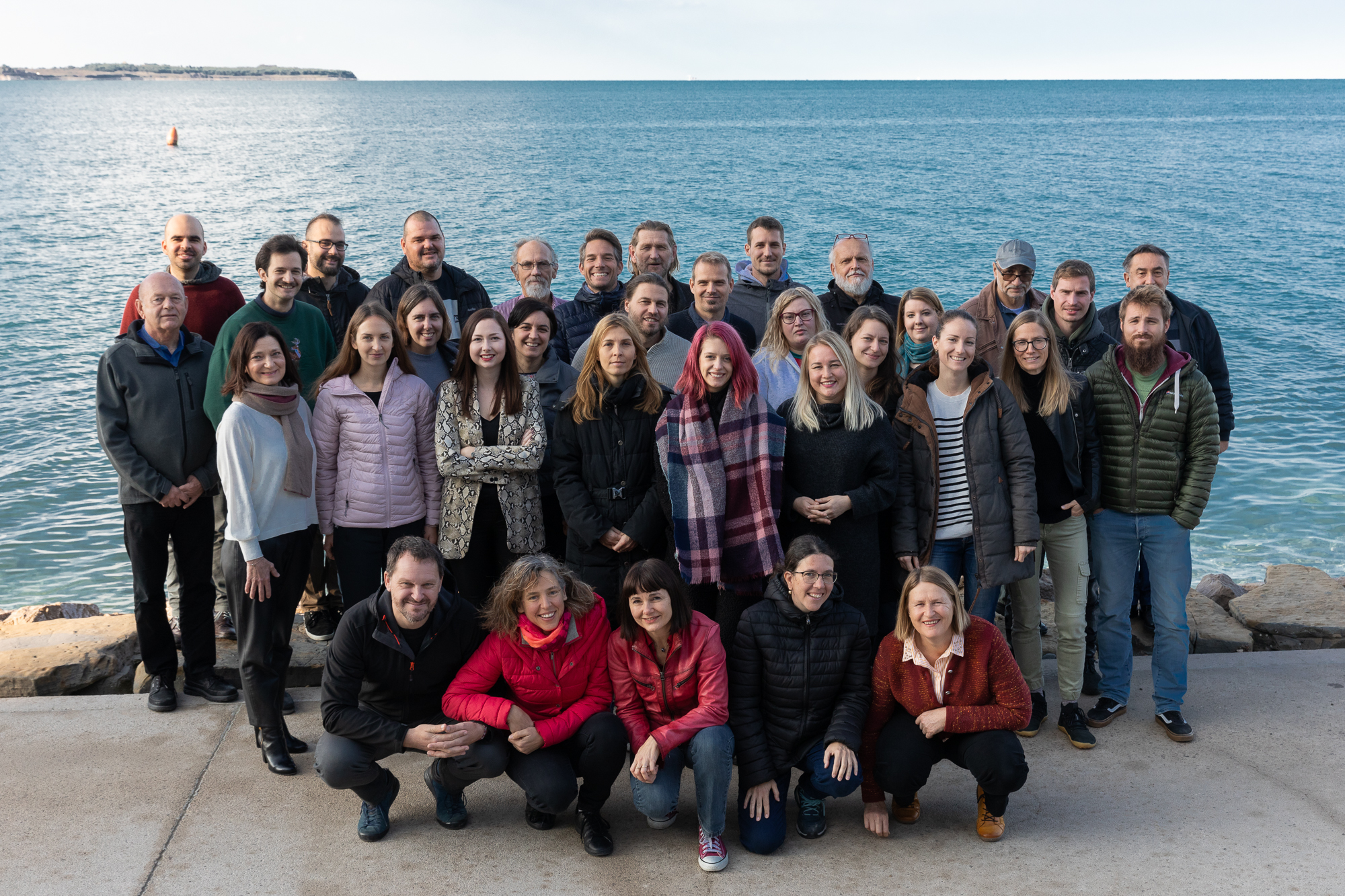
By clicking on the link below you will get a better overview of our working areas and conducted research. You are warmly invited to look at the list of our most important ongoing projects in the current year. Check the list of our personnel and our professional working fields of research. Last but by no means least you are invited to see the list of services and products we offer (contact This email address is being protected from spambots. You need JavaScript enabled to view it.).
Storitve in Produkti
Preberi večStoritve in Produkti
Preberi večDelovna področja in Raziskave
Preberi večDelovna področja in Raziskave
Preberi večAktualni projekti
Preberi večAktualni projekti
Preberi večOsebje
Preberi večOsebje
Preberi več
 NIB - MORSKA BIOLOŠKA POSTAJA PIRAN
NIB - MORSKA BIOLOŠKA POSTAJA PIRAN

